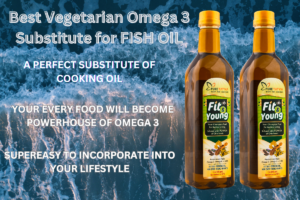Hidden Amazing substitutes for fish oil for vegetarians –
Use of Fish Oil and why substitutes for fish oil for vegetarians are needed –
Fish oil, as we know, by taking it we can protect ourselves from very serious diseases. Especially heart diseases, liver related problems, cholesterol, blood pressure, high triglycerides. It has a significant impact on problems related to hormonal imbalances like PCOD or PCOS. But taking fish oil is not possible for everyone. Hence it is important to reveal substitutes for fish oil for vegetarians.
Apart from this, a class of non vegetarians are avoiding it due to the threat of increasing pollution in the sea. Our oceans are now turning into scrap yards of heavy metals, radioactive substances, industrial pollutants and microplastic waste.

So if you are also one of those who want to avoid fish oil for these obvious reasons. Then In this article we will discuss in great detail and will expose hidden amazing substitutes for fish oil for vegetarians.
What are Omega 3 Fats and their different types ?
As we told you, fish oil is effective in many diseases. But what is the special thing in it that is making it so effective? So here it would be interesting to tell you that the secret behind its power is Omega 3.
So let us first know what omega 3 fats are ?
Omega 3 is a very broad topic but we can start by knowing that it falls under the category of polyunsaturated fats. They considered the healthiest fats for mankind.
These omega 3 fatty acids can be divided into these broad categories –
- ALA (alpha linolenic acid) – These ALA omega 3 fatty acids are considered most effective in heart diseases. They are essential fatty acids that our body cannot make on its own. So it is very important to include them in your diet. Fortunately the only way to get them from our diet is a vegetarian diet. Hence it is important for you to know substitutes for fish oil for vegetarians. Detailed information about their sources will be found in this article.
- eicosapentaenoic acid (EPA) and docosahexaenoic acid (DHA) are long-chain polyunsaturated fatty acids that are obtained from fish oil or fatty fish. However, ALA Omega 3 allows our body to produce both of these fatty acids on its own.
It means, if ALA Omega 3 from vegetarian sources are consumed in moderation then our body is capable of converting it into long chain DHA and EPA fatty acids. Some groups definitely do question its low conversion rate which is around 15%. But it has been proven in studies done on different levels that individuals consuming moderate amounts of ALA Omega 3 fatty acids were found to have healthy levels of DHA and EPA fatty acids too.
So this looks to be good news for all vegetarians. Also for those people who want to avoid fish oil because of fear of contamination due to pollution of heavy metals, radioactive material, industrial pollution, microplastic threats or any other reason.
Omega-3 health benefits
- Omega 3 is an integral part of the most basic building blocks of the human body i.e. cells. Hence the deficiency of Omega 3 affects both your mental and physical abilities.

- Our brain itself is made up of around 18 – 22 % of Omega 3 Fatty acids. Its deficiency has a direct impact on our mental ability. Specially on the ability of children to think and understand. You can say that the whole central nervous system gets affected by it. Whether it is behavioral disorders in small children and teenagers or Alzheimer’s disease in the elderly – deficiency of omega 3 is the main cause of it.

- Because Omega 3 deficiency adversely affects your cardiovascular system and respiratory system. Its deficiency has damaging effects on endocrine system as well as complete immune system. Due to which you feel a decrease in your physical abilities. This further makes you face heart-related diseases like high blood pressure, high cholesterol, high triglycerides, non alcoholic fatty liver and even early age heart attacks etc.
- Deficiency of Omega 3 is pushing a larger part of the population towards lung related problems and weak immune system. Diseases related to hormonal imbalances like thyroid, PCOD and PCOS are also on a rise. So consuming Omega 3 in appropriate quantities is a very underrated solution. It can prove effective in saving a very large population of ours from all these diseases.

The Power of Plant-Based Omega-3:
- As already informed in this article, ALA Omega 3 can be availed only from plant sources. Further it is an essential fatty acid which the human body cannot produce on its own. So this means that consuming this plant based ALA omega 3 fatty acid through your diet is most important for your health.
- One more unique characteristic of this fatty acid makes it most powerful. It is its unique strength of getting converted into DHA and EPA omega 3 fatty acids. Means, ALA Omega 3 fatty acid is the precursor of DHA and EPA fatty acid. Questions are often raised on its conversion rate. However, in various researches, this plant-based omega-3 has been found to be complete and powerful.
- This ALA omega-3 can be found in certain seeds and nuts. People often try to fulfil their requirement through these whole seeds and nuts. But if we want to get the real power of plant based omega 3 then we have to include its concentrated form in our diet. Concentrated form ! Yes, Not Whole Seed but Pure Seed Oil.
- You will find many articles where seeds and nuts are mentioned as the source of ALA omega 3. But the difficulty of including seeds in the diet and the lack of time in today’s fast lifestyle is making it difficult to reap the benefits. Further eating too much raw seeds can cause bloating and digestive problems. So a secret solution to unleash the power of plant based omega 3 is to include concentrated form i.e. Seed Oil in your diet.
Substitutes for Fish Oil for Vegetarians
Chia Oil as best plant based Substitutes for fish oil for vegetarians –
Chia oil is obtained from chia seeds. These are oval-shaped, small seeds. These seeds are rich in nutrients and are an excellent source of omega-3 fatty acids. It is the largest superfood of the twenty-first century, according to scientists.
Cold press oil obtained from Chia seeds has as much as 73% of ALA Omega 3. Unlike other seed oils, Chia oil has a high smoke point of 230 degrees. Means you can consider it, the healthiest and most stable oil.
Fit & Young Oil as the best Substitutes for fish oil for vegetarians –
Fit & Young is an excellent vegetarian and clean alternative of fish oil. It is a unique blend of Chia oil infused into Rapeseed oil. It is a result of extensive research. With a high smoke point this unique blend is perfect to substitute your regular cooking oil. Fit & Young is 100% natural and made using cold pressed technology.
It’s completely chemical free process completes your quest for the healthiest oil. Today, adulterated and chemically processed cooking oils are ruining the health of our whole family. Diseases like high cholesterol, high triglycerides, fatty liver, hormonal imbalance, PCOD and PCOS have become a part of every family.
Fit & Young offers an amazing ratio of 9% ALA Omega 3 and 14% Omega 6. A small habit of cooking in Fit & Young oil can help your whole family meet the Omega 3 deficiency naturally. It does not matter whether you are including omega 3 rich nuts in your diet or not. But if you are cooking your food in Fit & Young then every bite of it will be full of natural omega 3.
Apart from preventing diseases, it also speeds up post-workout recovery. Plus, its natural Omega 3 and Omega 6 enhance athlete’s performance over time. That is why it is becoming the first choice of gym goers and sportsmen as well.
These features of Fit & Young and its easy to use as a cooking oil makes it the best omega 3 supplement. Hence can be considered as one of the best substitutes for fish oil for vegetarians.
Walnuts oil –
One dependable vegetarian source of omega-3 is walnuts. Whole walnuts are especially popular as a snack due to their neutral and unique taste. Walnut oil is obtained from walnuts. Walnut oil is also an excellent vegetarian source of natural ALA omega 3.
But walnut oil has a low smoke point. Walnut oil’s low smoke point restricts its broad use. Due to its unstable nature, its taste and smell deteriorates over time. That is why if you want to use walnut oil then it is not advisable to store it for a long time.
Flaxseed Oil –
Flax Seed oil is obtained from flax seeds. Flaxseed oil has been considered very healthy since ancient times. The elderly people of India are well aware of its health benefits, thanks to its Omega 3 Fatty Acids. But excessive use of these seeds can create bloating and digestive issues.
However, you can easily include them in your diet in small amounts. It would be fine to sprinkle it on your food in the form of a whole seed. However, it’s always better to use Flaxseed oil to get concentrated amounts of Omega 3. But its low smoke point and unstable nature limits its widespread use and makes it not that great choice among substitutes for fish oil for vegetarians.
When exposed to high temperatures, it turns into free radicals which can be harmful to your health. So flaxseed oil can be used in salad dressing. If you don’t mind a different smell, flaxseed oil can be a great source of omega-3 fatty acids.
Algae Capsules –
Omega 3 DHA and EPA are found in abundance in the algae found in the ocean. Fishes also get omega 3 by eating this algae. Larger non-algae eating fishes eat smaller fishes and get omega 3 from them. This algae can be consumed as tablets and capsules. However, if you are concerned about contamination from heavy sea pollution. Then its consideration as substitutes for fish oil for vegetarians should only be done after getting the correct information about its source.



